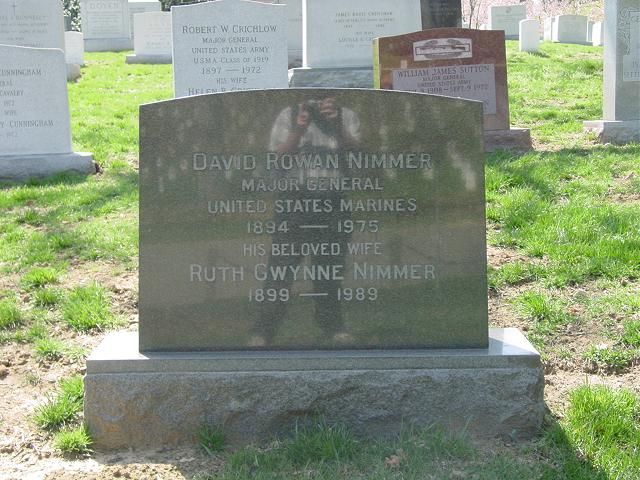From a contemporary press report:
Dvid Rowan Nimmer, a retired Marine Corps Major General and linguist who retired from active duty on July 1, 1947 after 32 years in United States Marine Corps, died August 23, 1975.
During his career he had served as Commander of the Rear Echelon of the 2nd Marine Division and acting Comanding General of Camp Lejeune, North Carolina, during the Division’s maneuvers in the Caribbean.
He first enlisted in the Marine Corps in 1912, and rose from the ranks to commissioned status in World War WI, and in World War II he held many assignments of distinctive nature.
A native of St. Louis, Missouri, he was born on October 14, 1894, and spent his youth in St. Louis and in Los Angeles. He enlisted in the Marine Corps on November 12, 1912, and reenlisted a few days before the U.S. declared war on Germany in 1917. Less than a year after start of war was commissioned a Scond Lieutenant, and before its end became a Captain. He resigned his commission in 1919, but returned to the Marine Corps as a Captain in April 1921, serving continuously since that time.
Following duty at Quantico, Virginia, in the uartermaster Department, as Commanding Officer of companies in both 5th and 6th Marine Regiments, he joined the Battle Fleet as Commanding Officer of the Marine Detachment aboard the USS Mississippi. He returned from sea duty in 1927 joining the staff of the Marine Corps Schools, Quantico, remaining there until 1929, when he was ordered to duty with 4th Marine Regiment in Shanghai, China. He later was assigned duty as Commanding Officer of Marines on the USS Pittsburgh, flagship of the Asiatic Fleet. At the conclusion of tour of duty on the Pittsburgh, early in 1931, he was attached to the U.S. Legation in Peking, China, and assigned to a station in Harbin, Manchuria, for the purpose of studying the Russian language. He was in Manchuria during entire period of its conquest by Japanese, leaving in September 1932.
He was then assigned as Assistant Naval Attache at the U.S. Embassy in Moscow, serving under Ambassador William C. Bullitt. Returning to the U.S., he went on duty at Headquarters, Marine Corps, in Washington, D.C., and later, with the Bureau of Naval Intelligence.
When World War II began, he was operations officer of 1st Marine Div, was then assigned duty as Commanding Officer of the Marine Base, Naval Operations Base, Guantanamo Bay, Cuba. He went to the Pacific Area in October 1942 as Commanding Officer of the 9th Defense Battalion, participating in the Guadalcanal operation with that unit, but returned to the U.S. in April 1943, and was assigned to the staff of the COmmander-in-Chief of the U.S. Fleet, with duty as Naval Member of the Joint War Plans Committee of the Joint Chiefs of Staff. During that service in the U.S. he attended conferences between President Roosevelt and Prime Minister Churchill in Washington, DC, Quebec, and Cairo, and later executed a special mission which took him to every theater of operations in which U.S. and British forces were engaged.
Upon completion of this mission, returned to Pacific and assumed command of Corps Artilery, 3rd Amphibious Corps, participating with that unit in landing, seizure and occupation of Okinawa. He was promoted to Brigadier General in February 1944.
His medals and decorations include the Legion of Merit, the Presidential Unit Citation with one star, World War I Victory Medal with France clasp and one bronze star, the Expeditionary Medal, the Yangtze Service Medal, the American Defense Service Medal with base clasp and one bronze star, the American Theater Medal, and the Asiatic-Pacific Campaign Medal with two bronze stars.
He died at his home in Alexandria, Virginia,and was survived by his wife, Ruth G. Nimmer, a son, David C., both of Alexandria, a brother, Frank E. of Los Angeles, and a granddaughter. He was buried with full military honorsin Sectin 5 of Arlington National Cemetery on August 27, 1975.
Ruth Gwynne Nimmer (1899-1989 was buried with him.
Michael Robert Patterson was born in Arlington and is the son of a former officer of the US Army. So it was no wonder that sooner or later his interests drew him to American history and especially to American military history. Many of his articles can be found on renowned portals like the New York Times, Washingtonpost or Wikipedia.
Reviewed by: Michael Howard

